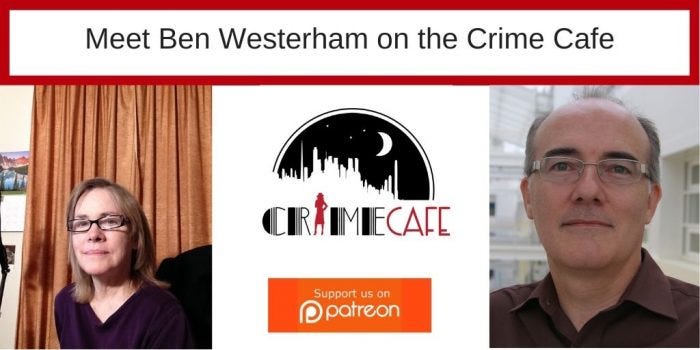Subscribe: Apple Podcasts | Google Podcasts | Spotify | Stitcher | Blubrry | Email | TuneIn | RSS | More
This episode of the Crime Cafe podcast features my interview with crime writer Ben Westerham.
Check out our discussion of his David Good P.I. and Banbury Cross Murder mystery series!
This is the Crime Cafe, your podcasting source of great crime, suspense and thriller writing. I’m your host Debbi Mack. Before I bring on my guest, I’ll just remind you that the Crime Cafe has two eBooks for sale: the nine book box set and the short story anthology. You can find the buy inks for both on my website, debbimack.com under the Crime Cafe link. You can also get a free copy of either book if you become a Patreon supporter. You’ll get that and much more if you support the podcast on Patreon, along with our eternal gratitude for doing so.
Check us out on Patreon: https://www.patreon.com/crimecafe
Debbi (00:54): But first, let me put in a good word for Blubrry podcasting.
I’m a Blubrry affiliate, but that’s not the only reason I’m telling you this. I’ve been using Blubrry Podcasting as my hosting service for my podcast for years and it’s one of the best decisions I ever made. They give great customer service, you’re in complete control of your own podcast, you can run it from your own website, and it just takes a lot of the work out of podcasting for me. I find for that reason that it’s a company that I can get behind 100% and say, “You should try this.” Try Blubrry. It doesn’t require a long-term contract, and it’s just a great company, period. It also has free technical support by email, video, and phone, so you can get a human being there. Isn’t that nice?
If you want to podcast, try out Blubrry. No long-term contract, excellent distribution, and great technical support, too, by email, video, and on the phone. I’ve included an affiliate link on this blog.
Here’s a PDF transcript of the interview!
Debbi: Hi everyone. My guest today is the author of two crime and mystery series. One is the David Good, PI series, and as you can see if you’re watching me on video—or not see if you’re listening—I’m holding up my Kobo with the second David Good book queued up and ready to read. I am a big fan at this point of the Good series, and also it is a good series, more than just the protagonist. He also writes the Banbury Cross Murder Mysteries, which I haven’t tried yet, but they certainly sound interesting. Originally from London, he now lives in rural Northamptonshire in the Midlands. I’m pleased to have with me crime writer, Ben Westerham.
Hi Ben, how are you doing today?
Ben: Hello, Debbi. I’m not so bad and it’s great to be here. Been looking forward to this for quite a while.
Debbi: I know. It took long enough, huh? My gosh, I cannot believe how many people are signing up for this thing. I’m booked into 2024, believe it or not.
Ben: You are super-popular, aren’t you?
Debbi: I don’t know how this happened. I don’t know. It’s one of those inexplicable things. I have to say that one of the things I enjoyed about the first David Good novel was that it was a hardboiled private eye story with a distinctive British feel to it. I’ve read all kinds of British fiction, all kinds of private eye fiction, but this one really felt like Raymond Chandler channeled through a British veil or with a British accent, and a feel of almost parody about it but not quite. Is that what you’re going for here? Is it parody?
Ben: I’m delighted to hear you say that. Yes. When I sat down to decide what I wanted to write for the first series, I’m not surprised; I read a lot of crime, so immediately I was drawn to crime. And I did then think I wouldn’t mind having a go at hardboiled, but I couldn’t get myself just to write straight hardboiled, I think in no small part it’s the old imposter syndrome thing. You just think so many other people done it so well, I’m going to come along and what am I going to do? But I do like humor as well so what I’ve tried to do is exactly those bits that you’ve already mentioned was to bring the hardboiled together with a British take on it and humor. So not comedy, but humor so you get a nice mix, cause sometimes the harder edges, there’s a nice counterpoint when you can bring in a bit of humor as well. So I’m delighted to hear you say that.
When I sat down to decide what I wanted to write for the first series, I’m not surprised; I read a lot of crime, so immediately I was drawn to crime. And I did then think I wouldn’t mind having a go at hardboiled, but I couldn’t get myself just to write straight hardboiled,
Debbi: That’s great because that’s the way it comes across to me and it’s humor with a ‘u’, so it definitely has … all your Britishisms, I just love them.
Ben: That’s quite interesting.
But I do like humor as well so what I’ve tried to do is exactly those bits that you’ve already mentioned was to bring the hardboiled together with a British take on it and humor. So not comedy, but humor so you get a nice mix, cause sometimes the harder edges, there’s a nice counterpoint when you can bring in a bit of humor as well.
Debbi: It’s awesome. The irony is that Raymond Chandler spent a lot of time in England as a child, so it’s almost like this seems perfectly natural somehow, even though he’s so associated with Southern California. This felt natural and fun and good to me. How many books have you written for the series?
Ben: People ask me this and then I go, oh, because I forget there’s the box set, so I think there’s seven now in that particular one in total.
Debbi: Seven! Wow!
Ben: But I’ve been writing some short stories for that series as well, so I’m just deciding at the moment what I’m going to do with those.
Debbi: Excellent.
Ben: So there will be some more coming along.
Debbi: That’s great. That’s a great idea. Do you have more novels planned for the series?
Ben: I’ve got no end of ideas. I don’t know you find this yourself, ideas just pop into your head all the time. So you jot them down. You add them to that never ending list of ideas that you’ve got. Some of them are for David Good. Some are for the Banbury Cross Murder Mystery Series. And I’ve decided to make things more difficult for myself by coming up with a third series, which I’m hoping to publish the first book of that this year. So I suspect there won’t be another David Good this year, but there could possibly be another one next year, and there will be other ones going forward because I just love writing those. I think partly because it’s the fact they’re written in the first person. I said sometimes to people, I feel as though I’m not merely standing there with Good. I’m like a parrot sitting on his shoulder. I’m that close and you just follow him around and that’s just fantastic to write.
I’ve got no end of ideas. I don’t know you find this yourself, ideas just pop into your head all the time. So you jot them down. You add them to that never ending list of ideas that you’ve got.
Debbi: Yes, yes it is. Absolutely. You capture a lot of London, the locations in London in the book as well. Do you do that in a deliberate way to try to create a London feel to the story, make London a character as it were?
Ben: Yeah. Well, I do that partly I’ve lived in London at least a couple of occasions. The first one I won’t remember because we moved when I was four. Yes, I can remember barely nothing of that, but that was south London. And then the second time I had a stint for about a year to 18 months. Again, I was spending most of my time in south London. So I was pretty familiar with that territory, which is why I decided to set the David Good stories there. I do think with those kind of books, you really want to do your best to get across the feel of the place – the sights, the sounds, the smells, everything. So I definitely try and put as much in there as I can without overwhelming people.
Debbi: Do you do a lot of research before you write a story?
Ben: Generally speaking, no. I do some research, but with the David Good books, I’ve written into the dark. I’ve been a pantser, no plotting, therefore no research. I know where they’re set. I know my characters; they’re already built up and honestly with David Good, I can just sit down, a sentence will come into my head and I’m gone and I just follow him.
I’m definitely one of those writers, once I start, I don’t stop to check up street names and things like that. I will just write down X, Y, Z if I need to and I will come back and do that little bit of research later on and just fill it in, just so I can keep the flow going so it does vary a bit. With the Banbury Cross murder mysteries, I did a little bit more research, partly because I didn’t pants those. I plotted those out for a bit of variety. So it worked to do it like that. But with David Good, no, I just write and tidy up afterwards.
I’m definitely one of those writers, once I start, I don’t stop to check up street names and things like that. I will just write down X, Y, Z if I need to and I will come back and do that little bit of research later on and just fill it in, just so I can keep the flow going so it does vary a bit.
Debbi: I love it. That’s just so cool. Tell us about the Banbury Cross mysteries. What are they about? I know they’re about an inspector and a sergeant.
Ben: Again, there’s going to be a common theme to that that we’ve already touched on. I wanted a second series like so many crime authors and readers of Agatha Christie I like, and Banbury, if you ever get the chance to visit the town, although it’s changed quite a lot over the last two or three decades, it’s got a definite feel about it that you can use for those kind of stories. Until very recently, it was pretty agricultural still in an English kind of way, and then it’s got lots of other towns around it like Leamington Spa and Warwick that are not too far away, which you can draw into the stories. So I decided I’d write something a little bit along the lines of Agatha Christie, but set in right at the very end of the 1950s, the first story. And then they move into the early 1960s. So they are murder mysteries, but again, I just couldn’t help myself. There’s a undercurrent of humor through those as well, and a little bit of romance thrown in.
So I decided I’d write something a little bit along the lines of Agatha Christie, but set in right at the very end of the 1950s, the first story. And then they move into the early 1960s. So they are murder mysteries, but again, I just couldn’t help myself. There’s a undercurrent of humor through those as well, and a little bit of romance thrown in.
Debbi: That’s very cool. So is it kind of like a cozy/police procedural?
Ben: I had to get used to some of these terminologies because as you may already have heard from people in the UK, it’s a crime or it’s a murder mystery really. So I’ve had to get used to the notion of a cozy mystery. There’s no blood and gore; there’s no sex or anything but I wouldn’t quite drop it into the cozy. If you just think of Agatha Christie, that’s the place where I’m pitching it really just so with that element of humor.
Debbi: That sounds good. What made you decide to create a second series and now a third?
Ben: Well partly it goes back to the thing I was mentioning earlier that you get so many ideas and you compart them for so long, and the draw to them gets too strong. You’ve got to do something with them. What I find there as well is there comes a point quite often where if I’ve got an idea if I don’t do something with it, it’s gone. I can’t really go back to it without forcing things along. Doesn’t come to me naturally anymore. Sometimes you don’t like to let them go, so you have to deal with it. I also wanted something that was giving me the opportunity to just set David Good to one side, take a break from it and write something else. I must admit as well being able to switch from first person to third person, that in itself is a nice change because as a writer it gives you different options and it’s nice to have those available to you. So you’ve got a broader style of writing.
I must admit as well being able to switch from first person to third person, that in itself is a nice change because as a writer it gives you different options and it’s nice to have those available to you. So you’ve got a broader style of writing.
Debbi: Yes, absolutely. Where is Banbury in England?
Ben: Banbury. If you picture where London is, then Oxford is about 30, 40 miles north of London, and then Banbury is about another 20 miles north of Oxford. It’s right up in the Northern border area of Oxfordshire, and it’s actually, it’s only about nine miles away from where I live, which is why I know it reasonably well and part of the reason i set the stories there.
Debbi: Yeah. Good approach there. What books do you enjoy reading?
Ben: I actually read very widely, which again I think is quite common with authors. So I’ve got a fiction book on the go and at least one nonfiction. You might be able to see behind me on the bookshelves there there’s lots of history books, so I’m a history graduate and actually enough, I read lots of history books. I might sometimes have a couple of nonfiction books on the go because one might be to do with writing or marketing, that kind of thing. In terms of the fiction, I read lots of crime and mysteries, but I read pretty much anything—sci-fi, fantasy. PG Woodhouse is one of my favorite authors so I read him as well. Anything that really looks like it could be a good read.
Debbi: Just out of curiosity, you mentioned fantasy. Do you enjoy Terry Pratchett, by any chance?
Ben: You know, I haven’t read any of his books. I did see one of his books as a play quite some time ago, and I watched Good Omens on the telly, which obviously he did with Neil Gaiman. But for some reason I’ve never got round to reading any of his books. I keep thinking I need to, but I need to wait for a gap on the shelf before I get some.
Debbi: Oh, he’s just fantastic. He’s fantastic. I love him. Have you thought about issuing audiobooks?
Ben: Yes. That’s definitely something that on my to-do list. and I do get asked about that occasionally. The one thing I have decided there is it won’t be me that’s going to be reading. I think there’s a definite art to doing that and that’s not one that I possess. That’s something I’d like to start working on those by the end of this year, with the view to start to get some out next year. As I say, I have been asked about them and it’s, as you might know yourself, is a bit of a growth market as well, so it’s a bit of a priority.
Debbi: Yes, very much so. Do you have a schedule on which you release your books, or do you just come out with them as fast as you can and get them out there?
Ben: Yeah, I did. It’s funny I used to have a timetable that I more or less worked to up until COVID came along, and then it completely destroyed my ways of working. It just went right out the window, and although I’ve largely recovered from that, I’ve not been able to get things back on track. And there did come a point last year where I just had to accept trying to set deadlines and get things out to a schedule. I was just giving myself stress because I simply couldn’t be sure that I was going to meet those deadlines. So at the moment, I take quite a relaxed approach, both to the number of books I’ll write and release each year, the deadlines associated with those. But I do want to get back to something that was a little bit better planned out, moving forward. I think as things … we’re almost back to normal here now, but not quite.
Debbi: Oh boy, I can so relate to everything you’re saying. The whole idea of taking it easy as far as pushing yourself too hard or any of that. Those are all great thoughts.
Ben: It’s just other people around the house. I don’t know if you find this. You’ll let people know don’t interrupt me please and the door still opens. And as soon as your concentration’s broken, …
Debbi: Well with me, it’s a little different. My husband is real good about that. I have to give him lots and lots of props for putting up with what I’ve been doing in terms of so much stuff—writing, podcasting. It’s gotten interesting. Did you do book signings at any point before the pandemic?
Ben: No, I haven’t yet. It’s interesting because again, it’s one of those things that I’ve been asked about, but actually whenever I’ve looked, I’d say about three-quarters of my readers are in the US. So I could do book signings in the UK and I pretty well will do it at some point, but actually if I really want to reach most of my readers, I have to hop on a plane, which has been a non-starter for a while.
Debbi: I would so love to do a book signing in some other country, but I’d have to hop on a plane.
Ben: Yeah.
Debbi: And all that stuff, unless it’s Canada.
Ben: I’ll send out the occasional signed book, but that’s all I’ve got to so far.
Debbi: What are you working on now?
Ben: Well, I’ve just had back from my editor the next in the Banbury Cross murder mystery series. That was one of those books, where even though I’d planned it out, it kept getting longer and longer, so it’s the longest of those stories so far. So I’ve got quite a lot of changes to go through, which I’ve started on those now. That will be released later this year, and I mentioned I’ve got a third series coming out, John Buchan type stories. Have you read any of John Buchan? The Thirty-Nine Steps?
Debbi: Oh, I’ve not read the story. I’ve seen the movie.
Ben: Well, that’s John Buchan. He wrote quite a few of those kind of boys’ own type stories.
Debbi: Oh wow.
Ben: My plan is to write a three-book or at least a three-book series of those type of stories.
Debbi: Cool.
Ben: The first one’s done. That’s ready to go, but I don’t like to release just the first book without having the second one either available or very close to being available. So that will be the next one that I actually sit down and write.
Debbi: Very good. How do you generally connect with fans?
Ben: As I mentioned to you when we were getting ready for this session, this is the first time I’ve done one of these. I’m a classic introverted author, which for the giveaway, I’ve stretched myself a bit more by putting that prize in there of a Zoom call with the winner so that would be interesting to see how that goes. That’s the kind of thing I want to do more of because up until now, mostly it’s through social media and my newsletter. Sometimes I will get very few emails and then other times, particularly if there’s a newsletter gone out or a new book’s gone out, I’ll get lots. And I do like to still take the time to reply individually to those. I don’t yet get the volume where that’s completely out of the question, but sometimes it is a bit of a stretch. But no, I want to get my face and voice out into the world a little bit more now.
Debbi: Understood. I know how you feel about the whole introvert thing. It’s hard to put yourself out there.
Ben: It Is, isn’t it?
Debbi: Yeah, it really is. What would you advise to people who are interested in writing for a living?
Ben: Writing for a living is very difficult. That’s the first thing. Even since Amazon came along, that’s quite difficult. I think the more general thing about writing is just the most obvious one. Just sit down and write. I know with me, I think I put this in the blog post, I wrote what I refer to as bits and pieces for decades. I can remember a story I wrote when I was 10 or 11 years old and ever since then, I’ve written in bits and pieces, and it just got to the point where one lunchtime at work, I thought this is just stupid. I can’t carry on like this. I’ve got to make that commitment. And I just picked up an old desk story and a pen. I went off to lunch, I had something to eat and I just started writing. Just the first idea that came to my head and I didn’t stop at all until I got to the end. It was … it still is…it’s on a shelf over there, gathering dust. Utter, utter rubbish, but that doesn’t matter because once you’ve done that for the first time, you know you can do it. You don’t have to persuade yourself. You’ve done it. So that’s the thing to do is just to sit down and write. And remember that nobody—absolutely nobody—is going to get to see anything you’ve written until and unless you choose to share.
Writing for a living is very difficult. That’s the first thing. Even since Amazon came along, that’s quite difficult. I think the more general thing about writing is just the most obvious one. Just sit down and write.
Debbi: That’s it. That’s exactly it. To go back to your Banbury Cross series for a second, it’s got two people in it who are like protagonists. Are they like oil and water? Do they conflict? Are they an odd couple?
Ben: That’s interesting. Inspector Dykeman and his Sergeant Shapes. When I was deciding what characters I wanted the two of those to be, I did at first think I would just have the classic clashing types, two people that are very different. And I just thought again, no, lots of people have done that. I’ll just spin it ever so slightly. So you’ve got inspector who is slightly… well, is a few years younger than his sergeant who’s a bit of a grump has been without any kind of romantic interest in his life for a very long time. But at the same time, they’re close enough to understand one another and to get along together well, so I just wanted to add some differences between them, but also for them to be a good match with one another so they were a good pair.
Debbi: I take it they’re more like puzzle mysteries.
Ben: Yes. They kind of say Agatha Christie type things where you have got a chance as the reader to try and work out who it was that did it, and there are some red herrings dropped in there. In fact, I’ve had a particularly good time with the one I’m writing at the moment, because my brain was very fertile when I was writing that one, and I’ve got more in there than even the normal. So one of the things I’ll have to do when I’m going back through it is deciding whether or not I’ve overdone it.
Debbi: Wow. That’s great. Is there anything else you’d like to add before we finish up?
Ben: I don’t think so, really. Just to thank you again for having me on the show. It’s absolutely fantastic.
Debbi: Well, I had a great time. Thank you for being here. It was great talking to you and I will just say in closing I want to remind everybody to please check out the Crime Cafe 9-book set and short story anthology. You can find the links in the program notes. You can also get free copies if you become a Patreon supporter, along with the other perks we provide, so do give it a look. Our final guest of the season will be John Raab, so I’ll see you in two weeks. Meanwhile, take care and happy reading.

















Share this post